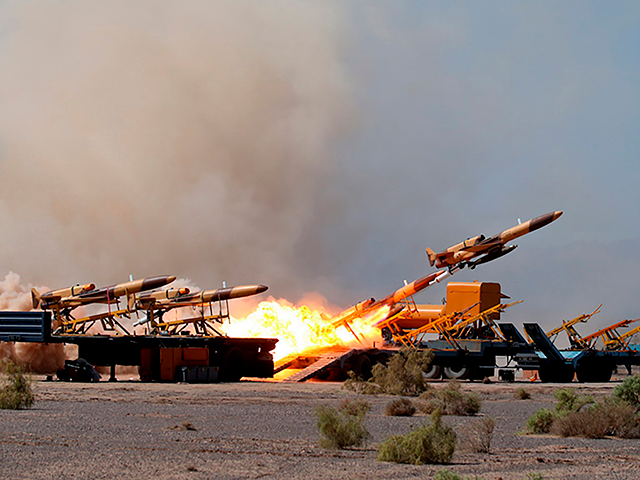The Iranian military held two days of very aggressive armed drone exercises on Wednesday and Thursday, even as the regime ostentatiously “reviewed” President Joe Biden’s desperate bid to revive the Obama nuclear deal — and signaled Biden is making concessions too slowly for Tehran’s taste.
Iran’s drone exercise involved over 150 unmanned aerial vehicles (UAV), operating everywhere from the Persian Gulf to the northern border.
Iran’s armed drones are a major source of concern for Western national security, as the despotic regime is planning to sell UAVs to everyone from Russia to its favorite Shiite terrorist gangs.
If Biden hands Iran a cash windfall through a revived nuclear deal, it is a safe bet some of those billions will go into improving drone technology and proliferating unmanned weapons platforms across the Middle East and around the world. Tehran makes no secret of its hopes that taking a leadership position in drone warfare will increase its wealth and international political influence.
Iran’s state-run Tasnim news agency described the drone exercises as a stunning success, as Iranian UAVs used “state-of-the-art weapons with pinpoint accuracy” to destroy “mock enemy targets.”
#Iranian Army has launched a large-scale exercise involving more than 150 advanced unmanned aircraft. Participated by troops from the four units of the Iranian Army, drill covers all areas across country, from #PersianGulf to northern territories pic.twitter.com/TnIEE2ieoK
— Tasnim News Agency (@Tasnimnews_EN) August 24, 2022
According to military spokesman Vice Admiral Seyed Mahmoud Mousavi, the drones used Iranian-made weapons “including Qa’em bombs, Almas missiles and MK-82 bombs” to blow up mock command and control facilities, fuel tanks, ammo depots, and radar installations.
Surveillance drones were also put through their paces in mock intelligence-gathering missions, including Iran-made “Yasir, Sadeq (Sincere), Yazdan and Ababil-3 tactical surveillance unmanned aerial vehicles” and the “Pelican vertical takeoff and landing (VTOL) naval drone.”
In July, U.S. intelligence monitored a Russian delegation visiting Iran to examine armed drones for possible purchase, including the Shahed-191 and Shahed-129 models. Russian leader Vladimir Putin is desperately trying to eliminate the advantage Ukraine’s defenders gained by skillfully employing Turkish-made drones. Putin’s efforts to strongarm Turkey into cutting off drone sales to Ukraine have been unsuccessful to date.
“Today, big countries have the purchase and use of the military production and achievements of the Islamic Republic of Iran on their agenda, including that of advanced drones. And this is considered a big source of pride for our dear nation in this era,” the Iranian Defense Ministry boasted last week.
The Defense Ministry took great pride in reaching “self-sufficiency in the production of technological power, in some cases unparalleled in the military field,” and bidding to become a major exporter of advanced weapons, despite “sanctions and economic war over the last four decades” from the United States.
Even as Iran showed off its drone weapons, it made a show of reviewing the latest Biden administration bid to revive the nuclear deal, a process Tehran expected to take several days.
Tasnim on Thursday quoted Iranian Foreign Ministry spokesman Nasser Kanaaani grousing about the Biden team’s slow response to Iran’s latest demands:
Iran submitted its response to the EU draft proposal on August 15, a week after the latest round of talks wrapped up. After submitting its response, Tehran urged Washington to show “realism and flexibility” in order to reach an agreement.
However, it took almost ten days for the Biden administration to submit its response to Iran’s comments on the EU draft.
On Monday, Kanaani said Tehran had responded to the EU’s draft proposal and was awaiting Washington’s response.
Mohammad Marandi, an adviser to Iran’s nuclear deal negotiations team, on Wednesday denounced a “completely false” report from Saudi television network al-Arabiya that the United States comprehensively rejected Iran’s latest round of demands.
Marandi also complained about U.S. “delaying tactics” and blamed President Joe Biden’s “internal problems,” coupled with pressure from “the Israeli regime and its supporters in Washington,” for Biden’s inability to close a deal with Tehran.

COMMENTS
Please let us know if you're having issues with commenting.